|
|
|
Sort Order |
|
|
|
Items / Page
|
|
|
|
|
|
|
| Srl | Item |
| 1 |
ID:
104483
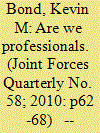

|
|
|
| 2 |
ID:
130381


|
|
|
| 3 |
ID:
117624
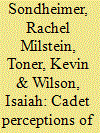

|
|
|
|
|
| Publication |
2013.
|
| Summary/Abstract |
Evidence of an actual or perceived gap in ideological beliefs between civilian and military communities informs current debates on the military and its relationship to broader society. The authors examine one cohort of the military and its members' perception of their own ideology in relation to their civilian counterparts using a 2009 survey of cadets at the United States Military Academy. The authors ascertain cadet perceptions of (1) cadet ideological leanings on individual and aggregate levels, (2) the ideological leanings of the civilian population, and (3) the civilian population's assessment of the military's ideological leanings. The authors attempt to discern whether or not this military subpopulation perceives itself as different from the rest of society. The authors find that while members of the Army's future officer corps perceive themselves as more conservative than their civilian peers and society writ large, as a group they hold rather moderate political views.
|
|
|
|
|
|
|
|
|
|
|
|
|
|
|
|
| 4 |
ID:
132046


|
|
|
|
|
| Publication |
2014.
|
| Summary/Abstract |
With rapid China now the world's second-largest economy, the status and Wrole of China's think tanks have become an increasing concern. On the whole, the international status of China' s think tanks is not
commensurate with the country' s current international status. The University of Pennsylvania' s The Global Go To Think Tanks Report published in 2014 said that as of August 2013, China had 426 think tanks, second only to the U.S. with 1,828. But of the top 100 non-U.,S. think tanks in the world only 5 are Chinese, and in the 150 most in?uential global think tanks, only 6 are from China-with the rest mostly from Europe. China' s think tanks lack professionalism and in?uence.' This is why China has been pushing to improve its think tanks internationally. In April 2013, President Xi Jinping proposed building a "new think tank with Chinese characteristics". To date this has been the clearest statement from a leader of China on think tanks? Decision of the CCCPC on Some Major Issues Conceming Comprehensively Deepening the Reform was passed in the 3rd Plenary Session of the 18th CPC Central Committee held in 2013. It clearly proposed"the building of new think tanks with Chinese characteristics and developing
a sound decision-making advisory system". China' s think tanks must make an international transition, but how can they do this'? What specific challenges are there? This paper will analyze these questions.
|
|
|
|
|
|
|
|
|
|
|
|
|
|
|
|
| 5 |
ID:
101327


|
|
|
|
|
| Publication |
2011.
|
| Summary/Abstract |
During World War II the Canadian Army was a small cadre force augmented by citizen volunteers. It was a colonial institution, dependent on the British Army for doctrine and staff training. After the war, the army became involved in a lengthy struggle to define its concept of professionalism. Modernizers aimed for a well-educated officer corps that was integrated with other elites and able to influence national security policy. Traditionalists wished to preserve regimental traditions and leadership based on social class. Contention between these factions resulted in stalemate, with modern management undercut by internal politics. The result was the failure of professional norms in the 1993 Somalia operation. Subsequent reforms have put a modern "constabulary-realist" model of professionalism in place.
|
|
|
|
|
|
|
|
|
|
|
|
|
|
|
|
| 6 |
ID:
154973
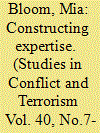

|
|
|
|
|
| Summary/Abstract |
The academic literature is divided with regard to whether terrorist recruits are dangerous masterminds, “malevolently creative,” and capable of perpetrating well-planned mass casualty attacks in the heart of European capitals. Or whether they are imbeciles, incapable of carrying out the most basic tasks, who mostly end up blowing themselves up by accident. This duality about the capabilities of terrorists is reflected in analyses of terrorist incidents. In fact, both depictions of terrorist recruits are accurate. Acuity and professionalism are not movement dependent (the same group may attract a variety of recruits) and might, instead, reflect a recruitment cycle that terrorist groups experience—one that alternates between labor-intensive and expertise-intensive periods of recruitment. The phases may shift because of external pressures (periods of territorial expansion/contraction) and opportunities (need for better quality recruits) with associated shifts in how groups use propaganda to attract a different quality of recruit during different periods of time. A possible first step toward hindering terrorist recruitment is to better understand the ways in which terrorist organizations work—where and when they recruit, whom they target, and the different propaganda messages used for selective/targeted recruitment. A clearer picture of the process could provide opportunities to counter a group's appeal, replenish their ranks, and inoculate vulnerable populations against recruitment. Case studies of three different terrorist organizations (Al Qaeda, the Islami State in Iraq and Syria [ISIS], and the Provisional Irish Republican Army [PIRA]) presented here posit that there exists a terrorism “recruitment cycle” that alternates between labor and expertise focus, uses different recruitment strategies and different propaganda messaging depending on this cycle.
|
|
|
|
|
|
|
|
|
|
|
|
|
|
|
|
| 7 |
ID:
182616


|
|
|
|
|
| Summary/Abstract |
The professionalization of transitional justice (TJ) has received extensive academic attention in TJ and related international relations and peacebuilding scholarship. This article adds an element that has received hardly any attention: namely the presence of activism even among professional and usually donor-funded TJ work. I argue that noticing activism in professional contexts requires attention to the ‘everyday’, meaning to life in between, aside and beyond high politics and officially important actors, actions, processes and events. Based on field research in Sierra Leone and Kenya, I describe and discuss everyday examples of a specific form of activism, namely tacit activism that I encountered with three key interlocutors, one Sierra Leonean and two Kenyan nationals involved in professional donor-funded TJ work. Their activism was ’tacit’ in the sense that it was not part of their official project activities and my interlocutors did not advertise their extra plans and efforts to (prospective) donors. And yet, it was precisely through these tacit plans and efforts that they hoped to meet at least some of the expectations that had been raised in the context of professional TJ projects.
|
|
|
|
|
|
|
|
|
|
|
|
|
|
|
|
| 8 |
ID:
161545
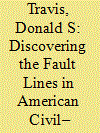

|
|
|
|
|
| Summary/Abstract |
This essay is in response to Thomas Crosbie and Meredith Kleykamp’s article that investigates relationships between what they consider to be three fault lines in the American military profession: ethical lapses, expertise, and identity. As they explore the literature to contemplate how professionalism might help to prevent ethical lapses, they also seek to reveal relationships between lapses, military expertise, and identity. To enhance the relevance of their research, it is recommended that they examine ethical lapses more broadly. Their core subject is American civil–military relations, which is a complex, contentious, and often ambiguous topic. They can mitigate the ambiguity by developing a clear problem statement and a set of research assumptions. In addition, because not all lapses are treated the same, they can be categorized to identify more serious lapses, which will allow for a focused examination of institutional responses to the lapses. Also, integrating other academic approaches such as political science and history into their research will improve the theoretical and explanatory power of their investigation. Adopting these and other aspects of inquiry will support the testing of their six hypotheses and improve our understanding of the military profession.
|
|
|
|
|
|
|
|
|
|
|
|
|
|
|
|
| 9 |
ID:
125277
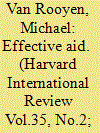

|
|
|
|
|
| Publication |
2013.
|
| Summary/Abstract |
Humanitarian assistance is aimed at providing rapid, life-saving support in settings of high population vulnerability, such as in times of war, disaster, or displacement. The provision of humanitarian assistance is complicated by severe access restrictions, large-scale emergency needs, displaced populations, and complex political and social settings. Both war and disasters create, and often amplify, existing economic disparities and contribute to an environment in which gender inequities, human vulnerabilities, and human rights abuses are likely to be exacerbated. The emergency response to large-scale humanitarian emergencies such as the 2010 earthquake in Haiti creates a sense of public urgency and political pressure to intervene. The last decade has seen significant advances in the standardization and coordination of relief and development activities, including improved mechanisms for coordination and accountability. While these efforts provided a solid basis for improved efficiency, they have faltered in recent large-scale crises. As the global relief and development community contemplates the next decades of humanitarian operations, a few essential questions should be raised: What are the most important barriers to providing effective aid? What future issues must be understood to optimize the efficiency of aid? What is the cost of inaction and what are the ramifications of not changing the system? This article will focus on some of the factors contributing to ineffective humanitarian aid and discuss the progress toward humanitarian reform, including the need for professionalism, coordination, and accountability.
|
|
|
|
|
|
|
|
|
|
|
|
|
|
|
|
| 10 |
ID:
121924


|
|
|
| 11 |
ID:
155214


|
|
|
|
|
| Summary/Abstract |
Offered the chance to create an intelligence studies program from scratch at The Catholic University of America, this recently retired career CIA officer and historian decided on two fundamentals. First, an ideal intelligence program would take a ‘Goldilocks’ approach, neither relegating intelligence to the fringes (as academia has done in the past) nor elevating it to a degree program (as is the approach at dozens of US colleges and universities). Because US intelligence agencies prefer their candidates for employment to have substantive knowledge of global issues and language skills, a certificate or minor program in intelligence will educate students about intelligence without depriving them of the opportunity to major in a substantive field. Second, an ideal program will involve former professional intelligence officers to a high degree; too many academic programs in intelligence suffer from the metaphorical ‘Bulgaria problem’ in which alleged experts on Bulgaria don’t speak the language, have never been to Bulgaria, and don’t see their lack of experience on Bulgaria as a problem. Smaller programs, taught mostly by retired practitioners, are the ideal for intelligence studies.
|
|
|
|
|
|
|
|
|
|
|
|
|
|
|
|
| 12 |
ID:
116860
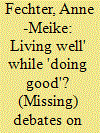

|
|
|
|
|
| Publication |
2012.
|
| Summary/Abstract |
This paper takes at its starting point public criticism of international aid workers who appear to be 'doing well out of poverty'. Based on fieldwork in Cambodia, the paper suggests that such public perceptions are mirrored by some aid workers' uncertainties about the moral dimensions of their own and others' lifestyles. Significantly, analyses of such public and private unease are largely absent from development ethics, even though comparable professions, such as nursing or social work, having produced substantial work on these issues. I argue that the scarcity of equivalent studies in development studies is partly the result of a tendency to foreground the 'other'-the world's poor-while rendering those who deliver aid invisible. Placing 'aid recipients' and 'aid givers' in separate categories, together with an emphasis on collective rather than individual moral responsibilities, not only makes it difficult to conduct open debates on the role of altruism and professionalism among aid workers, but also indicates how practices of 'othering' continue to inform aspects of development theory and practice.
|
|
|
|
|
|
|
|
|
|
|
|
|
|
|
|
| 13 |
ID:
096517
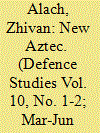

|
|
|
| 14 |
ID:
184583


|
|
|
|
|
| Summary/Abstract |
After a phase of slow development, e-commerce has become widespread in rural China, being promoted by both local governments and corporations. How has it changed business culture and business networks? Based on an ethnographic study conducted in a rural county in Henan, the article explores shifts in patterns of group formation and identity among local businesspeople. Fieldwork included 60 interviews with e-retailers, manufacturers, and local officials, as well as participant observation conducted from 2016 to 2019. The study suggests that online retailing has fostered the emergence of a shared ethos, which values quality and professionalism rather than the ability to build strong interpersonal ties through leisure and credit practices. This new ethos, congruent with state-sponsored, nationwide shifts in the economic structure, entails the emergence of a more far-flung integrated business community, while accentuating local processes of social differentiation.
|
|
|
|
|
|
|
|
|
|
|
|
|
|
|
|
| 15 |
ID:
153653


|
|
|
|
|
| Summary/Abstract |
Current discourses in education circles are on the professional status of the teaching profession due to teachers’ continued involvement in labour protests. This paper discusses whether teachers may still be considered as professionals or workers. There is an assumption that if formulated policies reflect on alleviating the plight and actual conditions in which teachers work, strikes can be halted resulting in quality teaching and learning in schools. A literature review was conducted to seek solutions to this impasse. It is expected that with insight into the actual teachers’ working conditions by policymakers, barriers that lead to endless labour protests may be alleviated to restore professionalism in teaching.
|
|
|
|
|
|
|
|
|
|
|
|
|
|
|
|
| 16 |
ID:
121916


|
|
|
| 17 |
ID:
186946
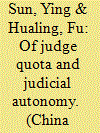

|
|
|
|
|
| Summary/Abstract |
This article presents the findings of original research on “judge quota” reform. The reform's agenda was essentially aimed at professionalization: by edging out a given percentage of judges, only the better qualified judges would be re-appointed to create a more professionalized judiciary. A key component of the reform was to reduce the level and the intensity of both political and bureaucratic control over judges in adjudication and to decentralize judicial power to the rank-and-file judges, restoring individualized judging while enhancing judicial accountability. This article critically examines the potential and limits of the judge quota reform in the context of incremental legal reform in a party-state.
|
|
|
|
|
|
|
|
|
|
|
|
|
|
|
|
| 18 |
ID:
140551


|
|
|
|
|
| Publication |
London, Europa Publications Limited, 2003.
|
| Description |
146p.pbk
|
| Standard Number |
0851424740
|
|
|
|
|
|
|
|
|
|
|
|
Copies: C:1/I:0,R:0,Q:0
Circulation
| Accession# | Call# | Current Location | Status | Policy | Location |
| 046753 | 658.47/BUR 046753 | Main | On Shelf | General | |
|
|
|
|
| 19 |
ID:
160697
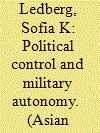

|
|
|
|
|
| Summary/Abstract |
The first part of this article discusses the most common theoretical and analytical approaches to the study of political control over the armed forces in China. It argues that the focus on professionalism and professionalization at the level of the military institution that is common in previous studies has certain limitations when analyzing Chinese civil–military relations. Against this background, the second part of the article suggests an alternative approach that places the Chinese officer corps and its professional autonomy at the center of analysis. Its benefit is demonstrated in a case study of quality control at China’s top three military education institutes. The study shows that autonomy and direct political control varies, which indicate a need for more nuanced discussions about military professionalization in China.
|
|
|
|
|
|
|
|
|
|
|
|
|
|
|
|
| 20 |
ID:
183840


|
|
|
|
|
| Summary/Abstract |
After decades of military reform, how does the Chinese military justify its persistent role in politics and social life? This mixed-methods study examines the discursive strategies used by military deputies to understand how a semi-professional military speak to its relations to the Party, its own organizational missions and goals, and potential conflicts between them. Computer-assisted text analysis is combined with targeted deep reading to identify and examine latent topics in comments made by military deputies between 2001 and 2017. The findings show that the military deputies simultaneously mobilize a political discourse and a discourse of professionalism. This duality of discourse constitutes a source of legitimacy for the military’s pursuit of corporate interests.
|
|
|
|
|
|
|
|
|
|
|
|
|
|
|
|
|
|
|
|
|